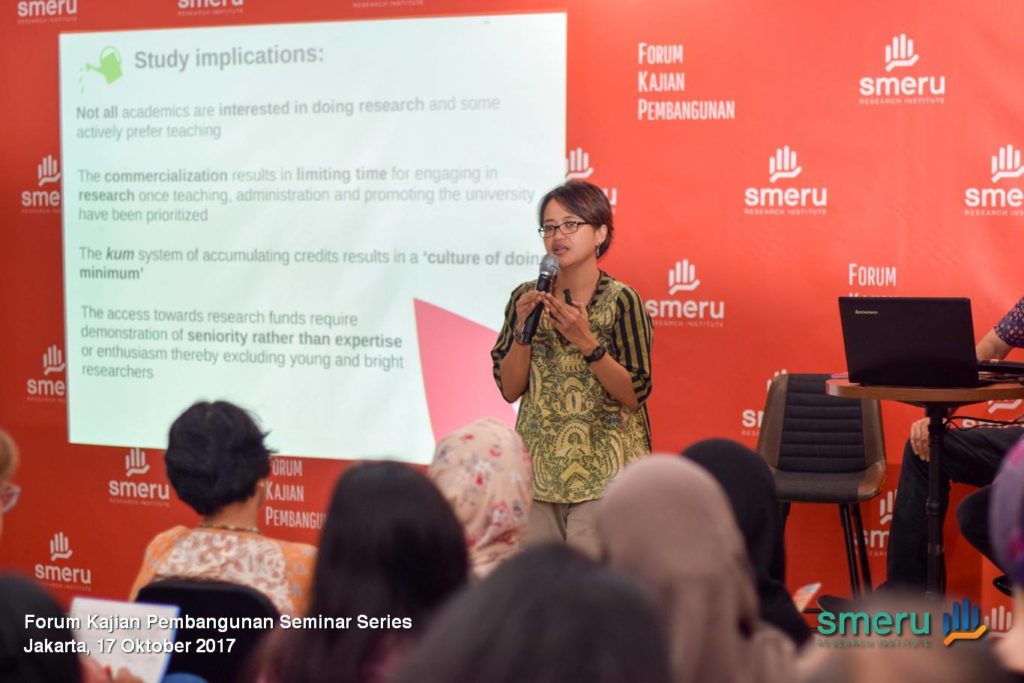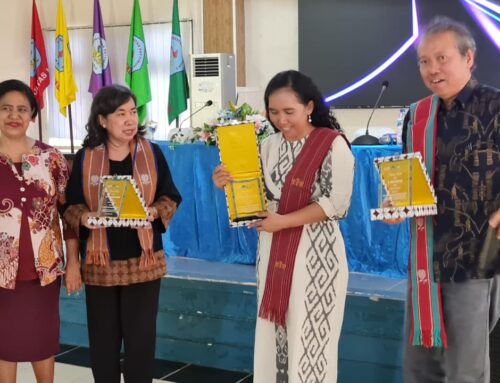On 11 October 2017, The SMERU Research Institute hosted an FKP seminar in which Yulia Sugandi (Faculty of Human Ecology, Institute Pertanian Bogor), together with Peter Riddell-Carre (RCA+ Project, Palladium Group) gave a presentation entitled “Multiple Realities in Light of the SDGs: The Reality Check Approach in Different Contexts”. SDGs (Sustainable Development Goals) provides a more globally holistic multidimensional goals that takes into account multiple stakeholders with contextualization and integration weaved into nationals and sub-nationals plans. The Reality Check Approach (RCA) is methodology to ensure the SDGs are up to date and in touch with peoples’ realities.
It is important to understand the varying stories and views as SDGs is being contextualized locally and it is achievable through the system thinking of RCA. RCA is living rather than visiting in order to really understand the nuances of life and the realities the families’ faces day to day. RCA also means having conversation rather than interviews as informal and two ways discussion leads to insights with context. This two factors are key towards acquiring a nuanced view on top of giving understanding on the complexity of the environment and the community.
One of the RCA studie done was on the perspectives and experiences of the research culture at universities in Indonesia. Studies similar to this have been done before in macro level but was yet to be done in an individual level which is where RCA came in. The research was done in 6 universities by 22 researches with 122 academics and795 people that include the community surrounding the academics. There are three major groups of academics: 1) juniors which complained that they were overburdened with teaching responsibilities and other tasks; 2) women which complained on gender consideration at the workplace; and 3) seniors which were burdened with administrative roles that impact their time for teaching and research. Then there are other layers if problems including but not limited to discipline, hierarchy, lack of intellectual freedom, and lack of publication infrastructure.
There are many implications from the study. Firstly, not all academics are interested in doing research and prefer to teach instead. Secondly, commercialization results in limiting time for research as other things are prioritized. Thirdly, the ‘kum’ system (a point system applied to academic activities) results in a culture to just do the bare minimum. The fourth implication is that seniority are prioritized instead of expertise in accessing research funds. Lastly, informal spaces are actually key to developing a vibrant academic culture.
The second RCA study was on household finances which aimed to gather insight on how people living in poverty perceive, handle, and plan their family finances. The study was done through 2200 people across 11 province from April to May 2016. Normally, household’s regular expenses is around IDR 60,000 rupiah which was mostly on food, snacks, and cigarettes. Other regular bills also includes electricity and mobile phone credit. There are also periodic expenses such as school and debt repayments. In regards to savings, a third of the respondents observed do not have cash savings at all and only three families have a bank account as banks are deemed to be remote physically and psychologically. For most households, savings comprise of easily liquidated assets such as livestock or gold. From this study the researchers uncovered the importance of cash, that incomes are unpredictable, that expenditure is affected by life cycles, that households prefer easy access to savings, are debt averse, and terrified of the formal financial sector.
As a concluding remarks, it is important to note that SDGs have a ‘leave no one behind’ mentality and RCA used in different contexts to understand multiple perspectives to ensure (sub)national plans can capture, embrace and reflect peoples’ realities with inclusive and relevant programs.

![[FKP hosted by ANU Indonesia Project] COVID-19, food insecurity, and cash transfer in Cambodia](https://www.fkpindonesia.org/wp-content/uploads/2024/02/fkp-2024-03-21-thumbnail-500x383.jpg)
![[FKP hosted by ANU Indonesia Project] Is it a curse or blessing to have a resource-rich neighbour?](https://www.fkpindonesia.org/wp-content/uploads/2024/02/fkp-2024-03-13-thumbnail-500x383.jpg)
![[FKP hosted by Universitas Padjadjaran] Kesehatan ibu pasca melahirkan di Indonesia](https://www.fkpindonesia.org/wp-content/uploads/2024/02/fkp-2024-02-21-thumbnail-500x383.jpg)

![[FKP hosted by ANU Indonesia Project] The pursuit of food self-sufficiency in Indonesia: food-trade policy preferences during the administrations of Yudhoyono (2004-2014) and Widodo (2014-present)](https://www.fkpindonesia.org/wp-content/uploads/2024/01/fkp-2024-01-16-500x383.jpg)